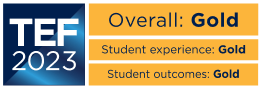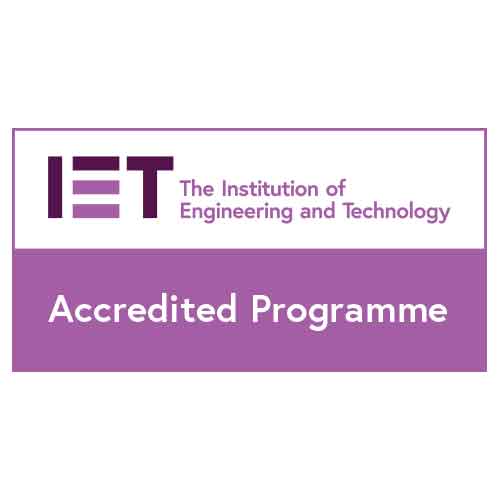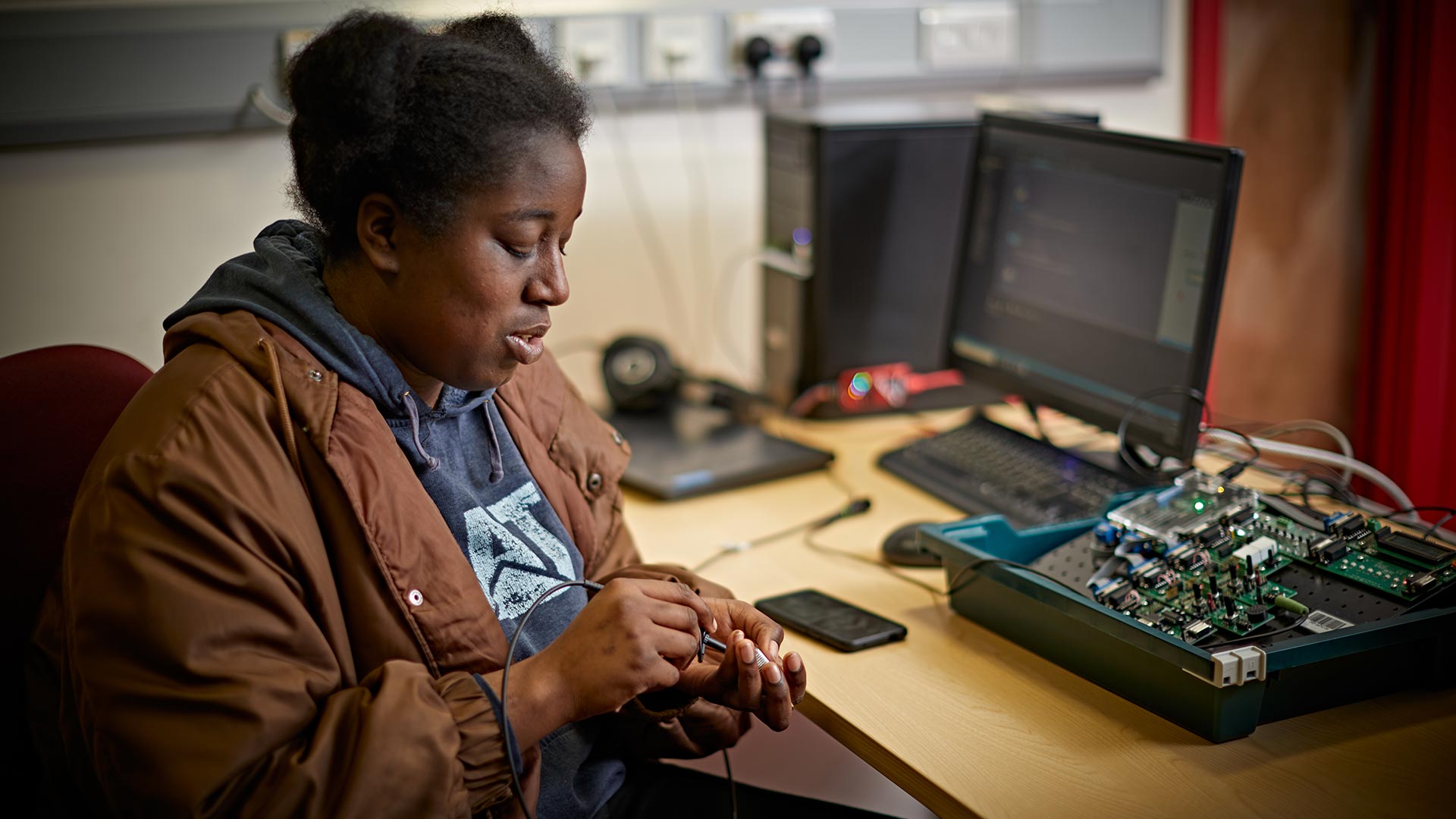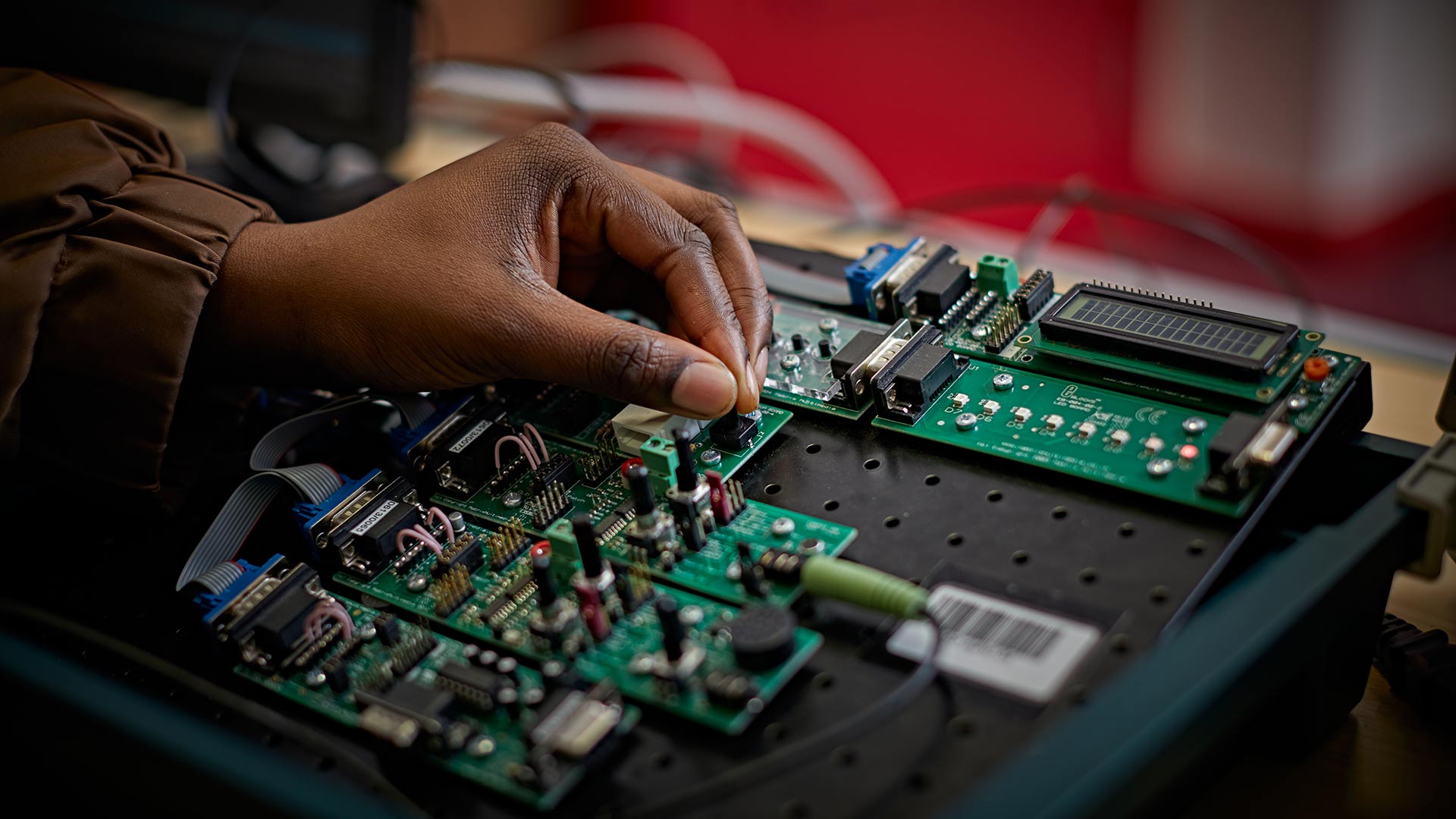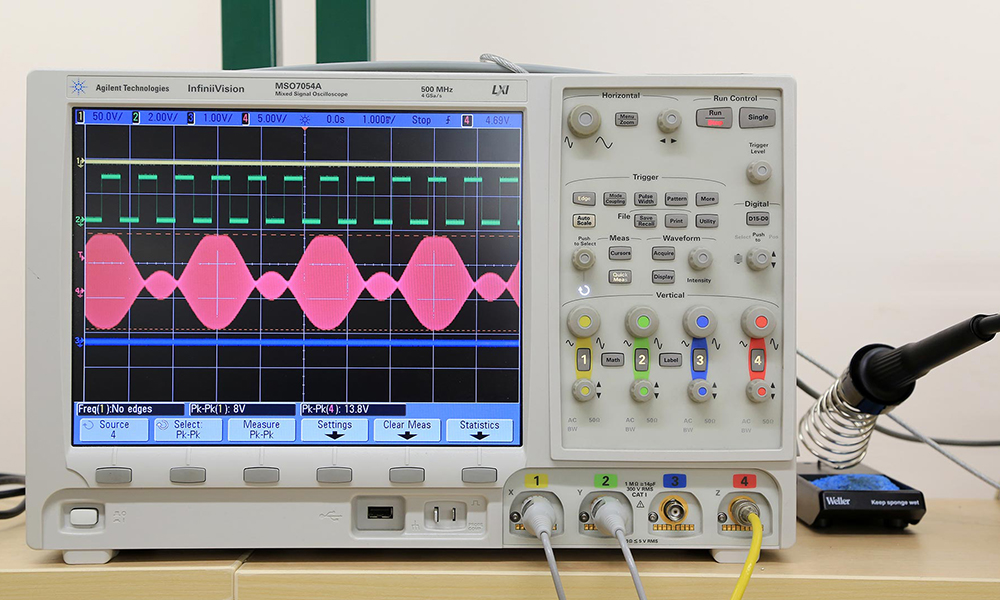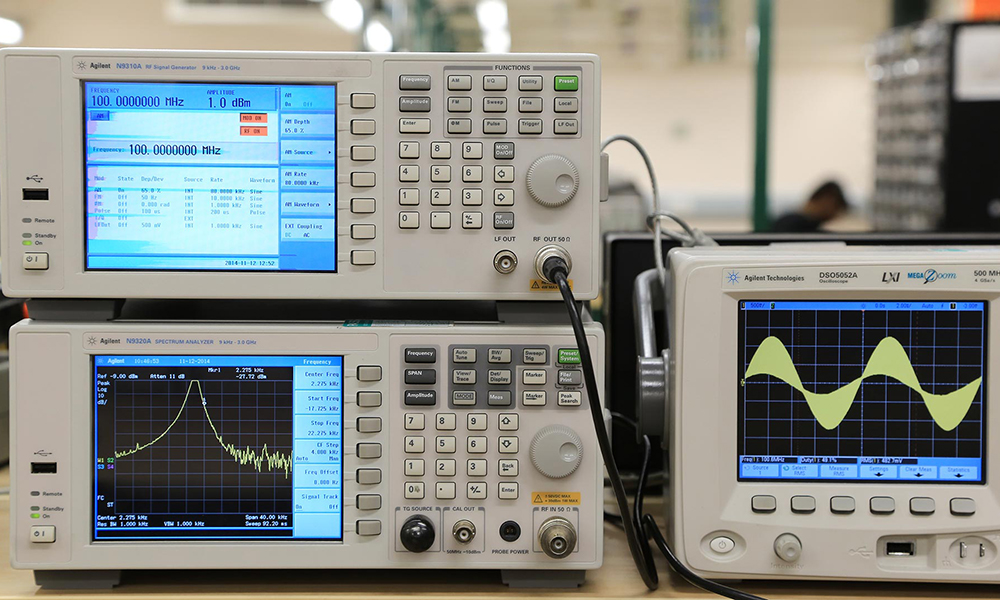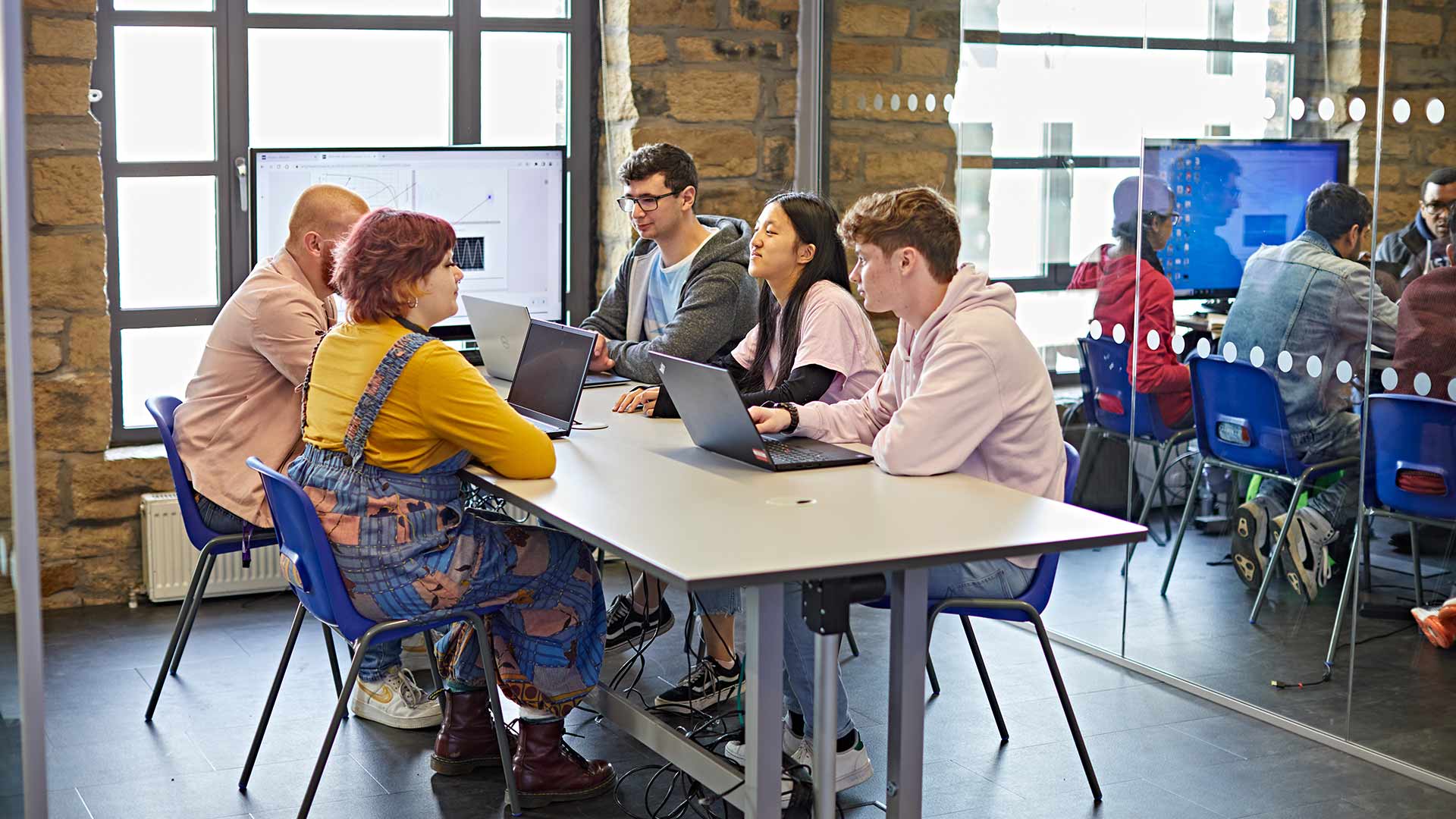Electronic and Communication Engineering BEng(Hons)
Start Dates
21 September 2026
Duration
3 years full-time 4 years inc. placement
UCAS Tariff
120-112
Overview
Why choose Huddersfield for this course?
- Explore areas such as digital and analogue system integration, AM and FM techniques, aerials and satellite communications with professional engineers.
- Our Common First Year helps you explore Electronic, Electrical, Mechanical, and Civil Engineering before specialising in the field that suits you.
- Simulate a real-world engineering environment and boost your employability through our unique EnABLE initiative.
Accreditation and Professional Links
Recognised connections to give you an extra edge when you graduate. Read More
Money isn’t the only thing that makes the world go round. Communications technology plays a crucial role in the stability of the global economy, with continuous advances in electronics and communications leaving an invaluable impact on the modern world.
The demands for new devices and environmentally sustainable solutions are only increasing as communications technology becomes even more advanced. This is where you can have an impact, studying Electronic and Communication Engineering could enhance your career prospects and lead to careers with vast earning potential, allowing you to create the lifestyle you want in the future. The top five job titles advertised in the UK for graduate roles associated with Electronic and Electrical Engineering are Electrical Engineer, Electrical Maintenance Engineer, Electrical Design Engineer, Electronic Engineer and Field Service Engineer*.
Our course is accredited by the Institution of Engineering and Technology (IET), which helps you achieve Incorporated Engineer (IEng) status and part of Chartered Engineer (CEng) status. In addition, in the 2025 National Student Survey, this subject area ranked top in Yorkshire for learning resources.
*Lightcast data extracted from Graduate Career Explorer – job postings from Dec 2023 to Nov 2024 showing jobs advertised associated with a selection of relevant graduate roles.
Career opportunities after the course *
Electrical Engineers
Electrical Design Engineers
Electrical Maintenance Enginee
Electronics Engineers
Principal Electrical Engineers
*Lightcast
Entry Requirements
BBB-BBC at A Level. A Levels must include Mathematics and at least one other suitable Science/Technology subject as listed in Additional Information.
120-112 UCAS tariff points from a combination of Level 3 qualifications which must include the accepted qualifications as listed in Additional Information.
Merit at T Level in Engineering and Manufacturing (Core) Full Qualification.
DDM-DMM in BTEC Level 3 Extended Diploma in Engineering. DDM-DMM in BTEC Science/Technology Level 3 Extended Diploma is also acceptable with A Level Mathematics at least at Grade C. See Additional Information for further details of what is accepted.
Access to Higher Education Diploma with 45 Level 3 credits at Merit or above in a relevant Science/Technology subject as listed in Additional Information.
120-112 UCAS tariff points from International Baccalaureate qualifications which must include Science/Technology subject as listed in Additional Information.
Additional Information
Applicants who are studying A Level Electronics but are not studying A Level Maths, may be invited to take a Maths test. Decisions will be based on a pass in the Maths test, as well as achieving the required UCAS tariff points.
Entry is also possible from the Engineering Foundation Year. To progress onto this course from the Foundation Year you must pass all modules and achieve an average mark of 40% or above.
A Levels (in addition to A2 Mathematics) must include one of the following: Electronics, Physics, Further and Additional Mathematics, Statistics, Design and Technology: Systems and Control, Computer Science, Chemistry.
BTEC Level 3 Extended Diploma in Engineering (instead of A2 Mathematics) must be one of the following: Electrical/Electronic Engineering, Mechanical Engineering or Engineering.
If your first language is not English, you will need to meet the minimum requirements of an English Language qualification. The minimum for IELTS is 6.0 overall with no element lower than 5.5, or equivalent. Read more about the University’s entry requirements for students outside of the UK on our International Entry Requirements page.
Other suitable skills or experience gained in a relevant industry will be considered. For further information please see the University's minimum entry requirements.
Course Details
This course offers an optional one-year work placement after Year 2.
Teaching and Assessment
Discover what to expect from your tutor contact time, assessment methods, and feedback process.
Global Professional Award
At Huddersfield, you’ll study the award-winning Global Professional Award (GPA) alongside your degree* — so you’re ready for the career you want, whatever subject you choose.
Placements
You’ll have the opportunity to complete an optional placement year (minimum 36 weeks, up to 48 weeks) in Year 3, either in the UK or abroad. This is your chance to gain hands-on experience, develop industry-specific skills, and enhance your career prospects. You’ll apply what you’ve learned in a real-world setting while exploring potential career paths.
Your placement will be monitored, and you’ll be assessed on your achievements, helping you refine your professional skills and prepare for your final year. Our Placement Unit and academic staff have strong industry connections and will support you throughout the process, from finding a placement to making the most of your experience. Students have previously secured placements with companies such as Nissan, Bosch, Sellafield Ltd, and Intel.
We have recruited engineers from University of Huddersfield with great success. Huddersfield students come equipped with the necessary skills for a career in electronic product design.
- John Dobson
Managing Director, Matrix Multimedia
Your Career
Previous graduates from courses in this subject area have gone on to work in a variety of roles such as Head of OT security, Senior Systems engineer, Electronic design engineer, a senior electronic engineer and senior metrology engineer in organisations including Rolls-Royce, Siemens, Mercedes and HMC.**
**Source: LinkedIn
80%
Percentage of graduates from this subject area who are in work and/or further study within fifteen months of graduation.
* (HESA Graduate Outcomes 21/22, UK Domiciled).
I chose my course because of the number of employment opportunities across the world. I liked Huddersfield a lot, the tutors are really helpful and the facilities on campus really impressed me, it's also an extremely friendly town.
- Aftab Afzal
Electronic and Electrical Engineering MEng, Electronics Engineer, Rolls Royce
Fees and Finance
This information is for Home students applying to study at the University of Huddersfield in the academic year 2026/27.
Please note that tuition fees for subsequent years may rise in line with inflation (RPI-X) and/or Government policy.
From January 2027 the UK government is launching a new student funding system for people starting university education. Read more about the Lifelong Learning Entitlement (LLE).
For detailed information please visit https://www.hud.ac.uk/study/fees/
This information is for international students applying to study at the University of Huddersfield in the academic year 2026/27.
Please note that tuition fees for subsequent years may rise in line with inflation (RPI-X) and/or Government policy.
For detailed information please visit https://www.hud.ac.uk/international/fees-and-funding/
Home
The tuition fee for a placement year is £1000. If you go on work experience or work placement, you will need to fund your own travel and/or accommodation costs to and from the placement. Please be aware that if your placement is outside of the UK, you will still be responsible for your travel and living expenses and may need to consider issues like health care and insurance costs.
International
The tuition fee for a placement year is £3,300. If you go on work experience or work placement, you will need to fund your own travel and/or accommodation costs to and from the placement. Please be aware that if your placement is outside of the UK, you will still be responsible for your travel and living expenses and may need to consider issues like health care and insurance costs.
Optional short field trips eg. one day, are sometimes also arranged. Previous field trips have included Advanced Engineering Exhibition and Silverstone Museum. The costs of these field trips are heavily subsidised by the school but can sometimes incur a nominal cost and/or deposit of between £5 and £40 depending on the trip.
Scholarships and bursaries Students doing IET accredited courses can apply for their scholarships and grants. For further information please visit the IET’s website.
Scholarships and Bursaries
Discover what additional help you may be eligible for to support your University studies.
Tuition Fee Loans
Find out more about tuition fee loans available to eligible undergraduate students.
What’s included in your fee?
We want you to understand exactly what your fees will cover and what additional costs you may need to budget for when you decide to become a student with us.
If you have any questions about Fees and Finance, please email the Student Finance Team.
Gallery
Explore More
Why Hud
Explore the unique opportunities and resources that make our institution a top choice for students seeking a well-rounded and future-focused education.
More Info
Careers support
We know you’re coming to university to study on your chosen subject, meet new people and broaden your horizons. However, we also help you to focus on life after you have graduated to ensure that your hard work pays off and you achieve your ambition.
Find out more about careers supportStudent support
At the University of Huddersfield, you’ll find support networks and services to help you get ahead in your studies and social life. Whether you study at undergraduate or postgraduate level, you’ll soon discover that you’re never far away from our dedicated staff and resources to help you to navigate through your personal student journey.
See our support servicesTeaching Excellence
Great teaching is engaging and inspiring — it helps you reach your full potential and prepares you for the future. We don’t just teach well — we excel — and we have the awards and recognition to prove it.
Find out moreInspiring Academics
Our researchers carry out world-leading work that makes a real difference to people’s lives. Staff within the Department of Engineering may teach you on this course.
Find out more about our staffResearch Excellence
You’ll be taught by staff who want to support your learning and share the latest knowledge and research.
Find out moreAccommodation
Looking for student accommodation? Huddersfield has you covered. HudLets has a variety of accommodation types to choose from, no matter what your preference. HudLets is the University’s approved accommodation service, run by Huddersfield Students’ Union.
Take a look at your optionsFurther Study
If you want to continue your learning beyond your undergraduate degree, there is a range of financial support available for postgraduate study, including discounts for Huddersfield graduates.
Discover postgraduate coursesLegal information
When you enrol as a student of the University, your study and time with us will be governed by our terms and conditions, Handbook of Regulations and associated policies. It is important that you familiarise yourself with these as you will be asked to agree to them when you join us as a student. You will find a guide to the key terms here, along with the Student Protection Plan.
Although we always try and ensure we deliver our courses as described, sometimes we may have to make changes for the following reasons:
Changes to a course you have applied for but are not yet enrolled on
If we propose to make a major change to a course that you are holding an offer for, then we will tell you as soon as possible so that you can decide whether to withdraw your application prior to enrolment. We may occasionally have to withdraw a course you have applied for or combine your programme with another programme if we consider this reasonably necessary to ensure a good student experience, for example if there are not enough applicants. Where this is the case we will notify you as soon as reasonably possible and if you are unhappy with the change we will discuss with you other suitable courses we can transfer your application to. If you do not wish to transfer to another course with us, you may cancel your application and we will refund you any deposits or fees you have paid to us.
Changes to your course after you enrol as a student
Changes to option modules
Where your course allows you to choose modules from a range of options, we will review these each year and change them to reflect the expertise of our staff, current trends in research and as a result of student feedback or demand for certain modules. We will always ensure that you have an equivalent range of options to that advertised for the course. We will let you know in good time the options available for you to choose for the following year.
Major changes
We will only make major changes to non-optional modules on a course if it is necessary for us to do so and provided such changes are reasonable. A major change is a change that substantially changes the outcomes, or a significant part of your course, such as the nature of the award or a substantial change to module content, teaching days (part time provision), type of delivery or assessment of the core curriculum. For example, it may be necessary to make a major change to reflect changes in the law or the requirements of the University’s regulators or a commissioning or accrediting body. We may also make changes to improve the course in response to student, examiners’ or other course evaluators’ feedback or to ensure you are being taught current best practice. Major changes may also be necessary because of circumstances outside our reasonable control, such as a key member of staff being unable to teach due to illness, where they have a particular specialism that can’t be adequately covered by other members of staff; or due to pandemics, other disasters (such as fire, flood or war) or changes made by the government.
Major changes would usually be made with effect from the next academic year, but may happen sooner in an emergency. We will notify you as soon as possible should we need to make a major change and will consult with affected groups of students and any changes would only be made in accordance with our regulations. If you reasonably believe that the proposed change will cause you detriment or hardship we will, if appropriate, work with you to try to reduce the adverse effect on you or find an appropriate solution. Where an appropriate solution cannot be found and you let us know before the change takes effect you can cancel your registration and withdraw from the University without liability to the University for any additional tuition fees. We will provide reasonable support to assist you with transferring to another university if you wish to do so and you may be eligible for an exit award depending on how far through your course you are.
In exceptional circumstances, we may, for reasons outside of our control, be forced to discontinue or suspend your course. Where this is the case, a formal exit strategy will be followed in accordance with the student protection plan.
The Office for Students (OfS) is the principal regulator for the University.
